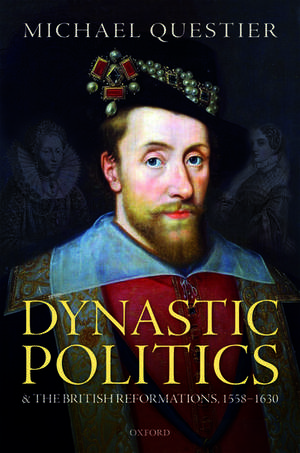Dynastic Politics and the British Reformations, 1558-1630
Autor Michael Questieren Limba Engleză Hardback – 31 ian 2019
Preț: 363.80 lei
Preț vechi: 391.48 lei
-7% Nou
Puncte Express: 546
Preț estimativ în valută:
69.61€ • 75.85$ • 58.66£
69.61€ • 75.85$ • 58.66£
Carte disponibilă
Livrare economică 24-29 martie
Livrare express 19-25 martie pentru 77.42 lei
Preluare comenzi: 021 569.72.76
Specificații
ISBN-13: 9780198826330
ISBN-10: 0198826338
Pagini: 518
Dimensiuni: 164 x 236 x 33 mm
Greutate: 0.9 kg
Editura: OUP OXFORD
Colecția OUP Oxford
Locul publicării:Oxford, United Kingdom
ISBN-10: 0198826338
Pagini: 518
Dimensiuni: 164 x 236 x 33 mm
Greutate: 0.9 kg
Editura: OUP OXFORD
Colecția OUP Oxford
Locul publicării:Oxford, United Kingdom
Recenzii
Michael Questier's new book is proudly old-fashioned, offering a narrative history of dynastic politics-the business of monarchical succession, royal marriages, and intradynastic alliance-in the Elizabethan,Marian, Jacobean, and early Caroline Britannic Isles. In other ways, the book is defiantly original.
The book largely accomplishes what Questier wants it to. It retells the oft-told political narrative of the ruling British dynasties after the Reformation but including perspectives that have been overlooked or simply discarded. The result is a fuller and more rewarding story, one that captures the centrality of religion and dynastic succession to many of the significant political disputes of the post-reformation in Britain and Ireland (and the Continent too). The book will be of interest to anyone who studies domestic and international politics from 1558 to 1630 in England, Scotland, Ireland or elsewhere on the Continent.
Pugnacious, peppery and lively, Dynastic Politics and the British Reformations, 1558-1630 succeeds in reintroducing and reintegrating Catholic voices into the 'mainstream' narrative, Questier railing against the historiographical tendency to view Protestantism as the consensus option. As far as contemporaries were concerned, religion and politics were up for grabs; there was nothing guaranteed about Protestant success.
This book offers a nuanced take on the place of religion in the world of political history, recognising that there was no single "Catholic" political position in this period, but rather a variety of views that changed in responseto political developments. ... I would certainly recommend this book to readers who want to read about the lesser-known Catholic perspective on well-known events in Elizabethan and Jacobean history.
Uncovering this Catholic strand at the center of British politics has been a major part of Questier's work ... Questier places the loyalist English Catholic laity in a central, if not a crucial, role in British dynastic and religious policy, rescuing them from both the rhetoric of their Protestant opponents and from the condescension of those Catholic historians who would wish for a more positively Roman expression of their faith. This is an important contribution of this deeply researched and densely argued book.
Questier emphasizes that this is not counter-factual history, but alternative histories can be felt hovering in the background. What if Elizabeth I had been deposed and replaced by Mary Queen of Scots? What if the Armada or the Gunpowder Plot had succeeded? Questier delineates a world in which those things remained possibilities. ... by "incorporating the ideological fissures and fractures", Michael Questier has supplied us with a valuable sense of how contested, divisive and rebarbative the early modern political process remained.
The book largely accomplishes what Questier wants it to. It retells the oft-told political narrative of the ruling British dynasties after the Reformation but including perspectives that have been overlooked or simply discarded. The result is a fuller and more rewarding story, one that captures the centrality of religion and dynastic succession to many of the significant political disputes of the post-reformation in Britain and Ireland (and the Continent too). The book will be of interest to anyone who studies domestic and international politics from 1558 to 1630 in England, Scotland, Ireland or elsewhere on the Continent.
Pugnacious, peppery and lively, Dynastic Politics and the British Reformations, 1558-1630 succeeds in reintroducing and reintegrating Catholic voices into the 'mainstream' narrative, Questier railing against the historiographical tendency to view Protestantism as the consensus option. As far as contemporaries were concerned, religion and politics were up for grabs; there was nothing guaranteed about Protestant success.
This book offers a nuanced take on the place of religion in the world of political history, recognising that there was no single "Catholic" political position in this period, but rather a variety of views that changed in responseto political developments. ... I would certainly recommend this book to readers who want to read about the lesser-known Catholic perspective on well-known events in Elizabethan and Jacobean history.
Uncovering this Catholic strand at the center of British politics has been a major part of Questier's work ... Questier places the loyalist English Catholic laity in a central, if not a crucial, role in British dynastic and religious policy, rescuing them from both the rhetoric of their Protestant opponents and from the condescension of those Catholic historians who would wish for a more positively Roman expression of their faith. This is an important contribution of this deeply researched and densely argued book.
Questier emphasizes that this is not counter-factual history, but alternative histories can be felt hovering in the background. What if Elizabeth I had been deposed and replaced by Mary Queen of Scots? What if the Armada or the Gunpowder Plot had succeeded? Questier delineates a world in which those things remained possibilities. ... by "incorporating the ideological fissures and fractures", Michael Questier has supplied us with a valuable sense of how contested, divisive and rebarbative the early modern political process remained.
Notă biografică
Michael Questier recently left East London to take up a senior research fellowship in the department of history at Vanderbilt University in Nashville. He also holds an honorary chair in the Centre for Catholic Studies at the University of Durham.
